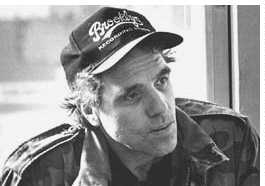DIRECTORS // Abel Ferrara |
Interview with Director |  |
|
"BAD LIEUTENANT was actually a song — that's the funniest part of it," says director Abel Ferrara, about the inspiration for his latest film. The hero of this song is "a guy wheeling around Manhattan like a lunatic or whatever the hell he is, you know what I'm saying?" Ferrara is amused by the notion of a ballad becoming an elegy to the decadence of the big city; little else seems to faze the 41-year-old New York City born-and-bred director, who casts a jaundiced eye upon the filmmaking process. "I wasn't really planning on making this movie, you know what I'm saying? It's a kind of film that I keep in the back of my mind, like a private thing. We'd goof around, me and friends of mine, and we'd come up with scenes." He even seems pleased that his interviewer had seen the end result of his "goofing around," BAD LIEUTENANT, at a depressing, run-down Times Square moviehouse, where the audience of 10 included two homeless men and a garrulous thrillseeker eager to give advice to Harvey Keitel's character during the drug scenes. Ferrara, a critical and cult favorite for his punchy, low-budget urban dramas, curdles a bit when asked about the improvisational contributions of Keitel, and the development of the film's plotline. "You're basically just shooting documentary, what's happening in a given space at a given time," he admits. "It's the thing that keeps you going because every time you get involved in projects, it's like the first film we ever did. You can have the same people, the same actors, make it seem homegrown, you know what I mean? It's still alien territory." From the beginning, the issue of violence has played a key role in Ferrara's art. As a youngster he began making short 8mm films as an expression of anti-Vietnam War fervor. In his first feature-length film, the notorious DRILLER KILLER, Ferrara himself (under protection of pseudonym) starred as a painter driven to distraction by a punk band rehearsing next door, thereafter redirecting his creative impulses to attack Bowery bums with a Black & Decker. MS. 45, about a rape victim who launches a vigilante murder spree, appealed to both feminists and gore-house fans. He also shot episodes of MIAMI VICE and the pilot of CRIME STORY. Following the extravagant, razor-sharp ruthlessness of drug lord Frank White in KING OF NEW YORK (Ferrara's last film), BAD LIEUTENANT's central character — referred to as LT — seems comparatively good, except he is a corrupt cop who is dead inside. "He's not the kind of guy that thinks of himself as bad; he's one of these cats that just exists and to him there's nothing wrong. This guy is not sitting there saying `There's a problem, I'm having a mid-life crisis'; when the movie starts he's having a ball. "Like there's this one scene that was the movie for me: a cat goes in and he rips off a Wiz store or something — not for much, he might have needed a TV set or a VCR, maybe he needed a radio, who the hell knows? He walks in and robs the place, and the next thing he gets a call: there's a robbery at the Wiz. He walks in, and he's interviewing the guy behind the counter, the guy is describing him, but he don't realize it because he's talking to ÔLieutenant So-and-So.' And he's taking down all this, writes out a piece of paper, walks out, throws the paper in the garbage. And that to me is the Bad Lieutenant, you know? We never got around to shoot that scene."
Ferrara's youthful zest to portray blood and mayhem may have matured slightly (just as his family life has developed since he and his wife adopted two orphaned girls from India). Violence as a means of expression or moral conflict — as opposed to simple brute force — has been common in his work, but in the case of BAD LIEUTENANT the withholding of violence becomes just as important. Here, Ferrara's camera is surprisingly aloof at crime scenes, barely registering the bloodied victims, to correspond with the coldness which these homicide detectives exhibit on the job. "Yeah, no one gives a shit," this kinder and gentler Ferrara explains about LT's seeming avoidance of brutality — or at least its requisite paperwork. "You gotta care about something to kill somebody. The people who are alive, the people who are dead, they're the same to LT, you know what I mean?" But LT is ultimately humbled by the pure victim loving her attackers when he meets a nun who has been raped. Witnessing apparitions of Christ, LT comes to demand redemption for himself, and sets out to mete justice in a non-physical or spiritual manner. "That he is able to turn it around, it takes a real human being to get that idea across, you know what I mean? You can't do it with camera moves, fancy cutting or anything, you know what I'm saying?" Zoe Lund, "Ms. 45" herself, wrote the screenplay for BAD LIEUTENANT and appears as a disturbingly serene junkie who plunges the old needle into the lieutenant's willing arm. When asked to describe her friend of almost 15 years, Lund finds a paradox — someone who can both awe and frustrate at the same time. "He has always been a close friend despite the fact there are times when I actually wanted to decapitate him," she said. "He can at times be quite sadistic — not in any sort of exciting way, just in a mundane, hideous fashion — even to his own detriment. He'd be the first to cut his own nose off to spite his face, if it gave him a sadistic thrill. But at the same time he can be fired up by the essential questions [like those] asked by Christ, and by LT. He can have a wonderful sense of humor, and he is very courageous. We all intended to go all the way with the movie and unlike many directors he went all the way with it, and didn't censor or self-censor in any way."
What doesn't seem surprising is his fondness for the randomness of events which overtake the unsuspecting characters of his stories; Fate is an ironic and cruel collaborator. He feels there are several movies going on at once — each character's tragedy, such as a senseless killing of an anonymous victim, is a story in itself — and so what if we never find out the conclusion to most of them? "Hey, you know, funky times man, funky town — what can you say, you know what I mean? Just turn the camera on and it's gonna be depressing. You just got to rise above all that, rise above to the beauty in all that." While not up to a Video Nasty certificate, BAD LIEUTENANT's drug scenes, sexual assaults and frontal nudity are pretty intense. Ferrara blasted the American ratings board for levying a more restrictive NC-17 rating, which limits distribution as well as advertising. "The rating system is anachronistic, like a push lawn mower. It's not even hip enough to be funny." But he is comfortable with the film's success in spite of its tag. "Theatres are gonna book anything that sells tickets. Theatres would book live sex acts — who cares, you know what I'm saying? And the studios will do anything that makes money. If Julia Roberts is going to finger-fuck herself in a closeup, I'm sure that somebody out there will put up the bread, you know what I mean? So that's where it's at." Ahem. Next up for Ferrara: a Hollywood tale called SNAKE EYES [a.k.a. DANGEROUS GAME], starring Keitel as a sort of Bad Director. "It's like THE PLAYER Meets CONTEMPT," Ferrara says. We think we know what he means.
Ferrara's latest films include THE FUNERAL starring Christopher Walken, and BODY SNATCHERS, a revisiting to the Jack Finney 1950's sci-fi classic. He also directed a segment for HBO's SUBWAY STORIES. |
copyright 1993, 2009 by David Morgan
All rights reserved.








 Another paradox is the way in which Ferrara talks, in a low, conspiratorial drawl, filled with verbal shorthand that is clipped and subdued — entirely opposite to the flashy and multi-layered visuals of his films. Ask him to describe his collaboration with Lund and he responds, "I'd tell her a bunch of shit and she'd make sense of it."
Another paradox is the way in which Ferrara talks, in a low, conspiratorial drawl, filled with verbal shorthand that is clipped and subdued — entirely opposite to the flashy and multi-layered visuals of his films. Ask him to describe his collaboration with Lund and he responds, "I'd tell her a bunch of shit and she'd make sense of it."